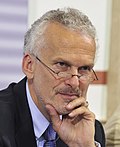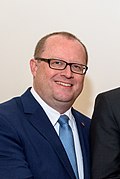First Kurz government | |
|---|---|
| 30th Cabinet of Austria | |
 | |
| Date formed | 18 December 2017 |
| Date dissolved | 3 June 2019 |
| People and organisations | |
| Appointed by | Alexander Van der Bellen |
| Chancellor | Sebastian Kurz (2017–2019) Hartwig Löger (Acting; 2019) |
| Vice-Chancellor | Heinz-Christian Strache (2017–2019) Hartwig Löger (2019) |
| No. of ministers | 13 |
| Member parties | Black–blue coalition: Austrian People's Party (ÖVP) Freedom Party of Austria (FPÖ) (2017–2019) |
| Status in legislature | Majority coalition (2017–2019) Semi-technocratic minority cabinet (2019) |
| Opposition parties | Social Democratic Party of Austria (SPÖ) Freedom Party of Austria (FPÖ) (2019) NEOS JETZT |
| Opposition leader | Christian Kern (2017–2018) Pamela Rendi-Wagner (2018–2019) |
| History | |
| Election | 2017 legislative election |
| Predecessor | Kern government |
| Successor | Bierlein government |
The First Kurz government (German : Erste Bundesregierung Kurz or Kurz I for short) was the 30th Government of Austria in office from 18 December 2017 until 3 June 2019. It succeeded the Kern government formed after the 2017 legislative election. Sebastian Kurz, chairman of the centre-right Austrian People's Party, known by its initials in German as ÖVP, reached an agreement on a coalition with the far-right Freedom Party of Austria (FPÖ), setting the stage for Kurz to become chancellor of Austria—the youngest head of government in Europe—for the first time. [1]
Contents
- Composition
- Leadership
- Ministers
- Chancellery ministers
- State secretaries
- Actions
- See also
- References
- External links
In the wake of the May 2019 Ibiza affair, Kurz terminated the coalition agreement and called for a snap election, which was ultimately held on 29 September 2019, after some disagreements over the timing. Kurz announced that his government would run as a minority technocratic caretaker government in the interim. [2] However, on 27 May 2019, his government was dismissed by the National Council through a motion of no confidence, the first successful parliamentary vote of no confidence in the Second Republic. [3] On 3 June 2019, President Alexander Van der Bellen swore in a technocratic caretaker government led by Brigitte Bierlein, which held office until the new coalition government between the ÖVP and The Greens was sworn in.















